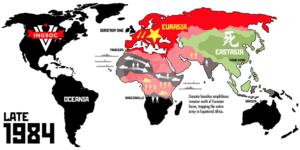Originally posted to Facebook in June 2017 in response to a comment on my post about what I wanted from Brexit asking what was so bad about further political integration with the EU. Edited for clarity.
I don’t have anything against federalisation as a concept. In fact, I think it would just wipe out a lot of conflict if we just instituted a federal UK and a confederated Israel-Palestine. But on why the UK and not the EU, I have two main concerns: one of democracy and one of the implications of the size of that federation.
On democracy, I have already written on that specifically in relation to the EU here and here. But essentially, I believe in local autonomous communities that co-operate from bottom up. I think it’s the most democratic and ultimately flexible way of living. People who know themselves and their communities are better placed to make decisions about how to live their lives then someone whose responsibilities view individuals as resources to be allocated. I need a good reason for the locus of power to be shifted upwards, because that knowledge is lost.
The EU is exactly the opposite of that: a huge, disparate entity that most of its “citizens” don’t understand and generally vote against in popular referenda when they do, and are made to vote again until they give the “right” answer. You can see this happening again with the campaign for a second referendum. Why would formalising that disempowerment be a good idea?
What we’d be creating, what we are creating, is a system which holds further political and social integration as axiomatic, specifically adopts neoliberal capitalism as its vision for both itself and the other nations it does business with, and levers huge economic and social pressure on recalcitrant states to comply (Greece’s public infrastructure being held to ransom for a decade because they couldn’t leave the Euro being the best example).
The second issue with federalisation is the scale of what we are talking about. World War I happened because- well, as Blackadder put it:
Captain Blackadder: You see, Baldrick, in order to prevent war two great super-armies developed. Us, the Russians and the French on one side, Germany and Austro-Hungary on the other. The idea being that each army would act as the other’s deterrent. That way, there could never be a war.
Private Baldrick: Except, this is sort of a war, isn’t it?
Captain Blackadder: That’s right. There was one tiny flaw in the plan.
Lieutenant George: Oh, what was that?
Captain Blackadder: It was bollocks.
Our world is now rapidly turning into multiple superpower blocs with armed capabilities several times what was available in World War I. This is bad. The federalists are very right in the sense that Europe has successfully kept the peace between European countries (at least militarily, I’m sure the Greek people feel somewhat differently) for fifty years but all that happened is that one of the most powerful forces in international politics having now settled its in-fighting with each other is now turning its attention to “peace-keeping” abroad. This is where jingoism starts. It starts with people believing they can “help” smaller nations to “democracy” and ends with several million dead in Iraq and Syria.
When people talk about 1984, they usually focus on the lives of individuals under totalitarianism and the internal politics of Airstrip One, but we often forget that the book was set in a world in which three global powers were at permanent war with each other, destroying the natural resources in the world in a war no-one can win but is fought to maintain internal peace. Creating another superpower in the form of a federal Europe with a unified foreign policy and a dedicated military force brings us closer to that future and I think that is very bad.

A single market is also not good for democracy or socialism, which is why Jeremy Corbyn’s followers are in the predicament of reconciling their belief that the EU is a fount of democracy, peace and prosperity and the reality that Jeremy Corbyn voted against the European Communities Act 1972 and has been opposed to “a huge free-market Europe, with ever-limiting powers for national parliaments and an increasingly powerful common foreign and security policy” since before I was born. I’m highly sympathetic to that argument, but I don’t think we really have an alternative in the capitalist world that already exists and we operate in. Socialism in one country didn’t benefit Russia and it won’t benefit us.
But the democratic/political aspect of it is something I think we can avoid. International co-operation is good, and positive, and the more the better, but small states negotiating with other small states as sovereign entities is much more democratic, and equitable, than huge superstates railroading their regions and effectively preventing any serious democratic conversations about the direction of the country, or how things could be different, or actual democratic organising. As a friend pointed out to me, why isn’t there a single European political party? As in, not just an alliance of smaller national parties, but an actual organised party across national borders? The answer is that it would be hideously hard to organise on a purely practical basis (also most EU countries ban them). As some point, you get too big to fail or function.
Sorry to get a bit apocalyptic but if we’re really going to talk about the EU in a global context then I see it as a bit more serious than my right to use my phone abroad without incurring roaming charges.